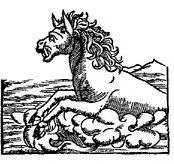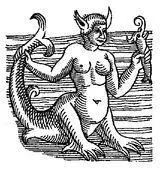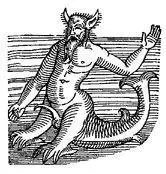In 1410, Cardinal Pierre d’Ailly described Asia according to the tales of travelers. On the island of Taprobane there were mountains of gold, guarded by dragons and by ants as large as dogs.
Antonio Pigafetta went around the world in 1520. He saw trees that sprouted leaves with feet, and during the day they leapt from the branches and went for a stroll.

According to the stories of ancient mariners, the sea was once still, an immense lake without waves or ripples, and it could only be navigated by paddle.

Then a canoe, lost in time, arrived from the other side of the world and found the island where the breezes lived. The mariners captured them and carried them off and obliged them to blow. The canoe rode on the captive breezes, and the mariners, who had spent centuries paddling and paddling, could at last lie down to sleep.
They never awakened.
The canoe crashed against a rocky cliff.
Ever since, the breezes wander the globe in search of their lost island home. Trade winds and monsoons and hurricanes roam the seven seas, in vain. To avenge that long-ago kidnapping, they sometimes sink the ships that cross their path.



A couple of millennia ago, Seneca foretold that someday the map of the world would extend beyond Iceland, known then as Thule.
Seneca the Elder, who was a Spaniard, wrote:
In the later years of the world, will come
certain times in which the ocean sea will release
the meekness of things.
And a great land will open.
And a new mariner,
like the one who guided Jason
and who went by the name Tiphys,
will discover a new world
and the island of Thule will no longer be the last of the lands.

Defying the fury of the winds and the hunger of ship-eating monsters, Admiral Christopher Columbus set sail.
He did not discover America. The Polynesians had arrived a century previous, and the Vikings four centuries before that. And three hundred centuries before them all came the oldest inhabitants of these lands, people whom Columbus called Indians, believing he had entered the Orient by the back door.
Since he did not understand what they said, Columbus was convinced the natives did not know how to speak. Since they went about naked, were docile, and gave up everything in return for nothing, he believed they were not thinking beings.
Although he died insisting his travels had taken him to Asia, Columbus did begin to harbor doubts on his second voyage. When his ships anchored off the Cuban coast in the middle of June 1494, the admiral dictated a statement affirming that he was in China. He left written evidence that his crew agreed: anyone saying the contrary was to receive a hundred lashes, be fined ten thousand maravedies, and have his tongue cut out.
At the bottom of the page, the few sailors who knew how to write signed their names.

The caravels left the port of Palos heading the same way as the birds, toward the void.
Four and a half centuries after the first voyage, Daniel Vázquez Díaz painted the walls of the Rábida Monastery, next door to the port, in homage to the discovery of America.
Although the artist intended a celebration, involuntarily he disclosed the rotten mood Columbus and his sailors were in. No one smiles in those paintings, and the long, somber faces portend nothing good. They sensed the worst. Perhaps those poor devils, pulled from prison or kidnapped from the docks, knew they were to do the dirty work Europe needed to become what it is today.

On his third crossing of the ocean sea, Christopher Columbus was clapped in chains and, in the name of the Spanish Crown, returned to Spain a prisoner.
In the name of the Crown, Vasco Núñez de Balboa lost his head. In the name of the Crown, Pedro de Alvarado was tried and imprisoned.
Diego de Almagro was strangled to death by Francisco Pizarro, who was then stabbed sixteen times by the son of his victim.
Rodrigo de Bastidas, the first Spaniard to navigate the Magdalena River, ended his days on the point of his lieutenant’s knife.
Cristóbal de Olid, conquistador of Honduras, lost his head by order of Hernán Cortés.
Hernán Cortés, the luckiest conquistador, died a marquis and in bed, but could not avoid being tried by the King’s envoy.

Botticelli’s Venus was a girl named Simonetta, who lived in Florence and married not Amerigo Vespucci, but his cousin. Lovesick, Amerigo drowned his sorrows in seawater rather than tears. And he sailed all the way to the land that now bears his name.
Under a sky of stars never before seen, Amerigo found people who had neither king nor property nor clothing, who valued feathers more than gold, and with whom he traded a brass bell for a hundred and fifty-seven pearls worth a thousand ducats. He got along well with these untrustworthy innocents, though he slept with one eye open in case they decided to roast him on a grill.
And he also feared losing his faith. Up to then he had believed, literally, in everything the Bible said. But seeing what he saw in America, Amerigo could never again believe the story of Noah’s ark, because no ship, no matter how immense, could hold all those birds of a thousand plumages and a thousand calls, and the outrageously prodigious diversity of beasts, bugs, and brutes.

Columbus left from the tiny port of Palos, not from Cádiz as planned, because it was filled to bursting. Thousands upon thousands of Jews were being expelled from the land of their forebears and the forebears of their forebears.
Columbus made his voyage thanks to Queen Isabella. So did the Jews.
And after the Jews, it was the Muslims’ turn.
For ten years, Isabella battled the final bastion of Islam in Spain. When Granada fell and her Crusade ended, she did all she could to save those souls condemned to eternal hellfire. In her infinite compassion, she offered them pardon and conversion. They answered her with sticks and stones. At that point she had no choice: she ordered the sacred books of Mohammed burned in the central square of the conquered city, and she expelled the infidels who persisted in their false religion and insisted on speaking Arabic.
Other expulsion decrees, signed by other monarchs, completed the purge. Spain sent into everlasting exile her children of befouled blood, Jews and Muslims, and thus emptied herself of her finest artisans, artists, and scientists, of her most advanced farmers, and of her most experienced bankers and merchants. In exchange, Spain multiplied her beggars and her warriors, her parasitic nobles, and her fanatical monks, all of untainted Christian blood.
Читать дальше






















